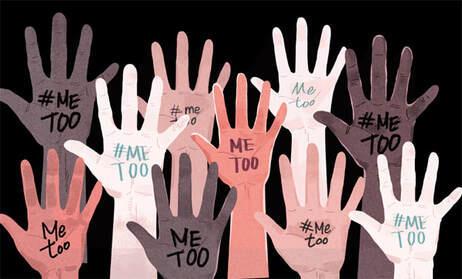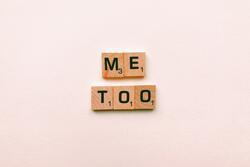Why We Still Need to Be Talking about #MeToo in the Jewish Community
Content warning: references to sexual assault
“Dahlia, I’m on my way, but I’m running late. I am dealing with a work crisis,” my mom announced, disquieted, when I answered the call. I squinted out of my window. The sun set earlier this evening than it had in a while. A few months past the start of eighth grade, and in a dusty cloud of post-bat mitzvah makeup, I was putting myself together to attend an evening showing of Denial at the local Jewish film festival with my mom.
I wasn’t shocked that she was going to be late. But the angst in her voice hung thick between us; her lack of words tipped me off that her delay was caused by something serious. She hung up after a moment, and I sat down on my unmade bed, a tube of caking concealer resting open on my windowsill.
The organization where my mother worked was one of many that planned to host esteemed Israeli Haaretz reporter and writer Ari Shavit on his Bay Area speaking tour. All his events had been abruptly canceled earlier in the day when Los Angeles Jewish Week blogger Danielle Berrin published a cover story on her blog in Jewish Journal, “Hollywood Jew,” entitled, "My sexual assault, and yours: Every woman's story," exposing Shavit for sexually assaulting her at a Los Angeles hotel a few years prior.
Emboldened by the #MeToo conversation gripping the nation in the fall of 2016, Berrin held accountable the leftist peacenik and Haaretz journalist that many in the liberal American Jewish community idolized in their aspiration for Israeli-Palestinian coexistence. Shavit was compelling a generation of Jews increasingly distanced from Israel’s far-right politics and Netanyahu to continue to love their homeland, in light of its flaws, not in spite of them. Copies of My Promised Land, Shavit’s conversation-changing novel, resided on the bookshelves of nearly every Jewish institution I walked into—in triplicate. The community took pride in splashing his name, identity, and values across our spaces. We felt startled witnessing the pain he’d caused, then covered up, unfurl in this flashy demise.
Berrin’s accusation prompted multiple women to come forward with nearly identical stories about Shavit. He issued pathetic apologies for the “misunderstandings,” which he chose to characterize as mild “flirting.” His brush-off stood contrary to Berrin’s account of Shavit making lewd sexual advances: he lurched at her, grabbing her head and forcing her towards his face. Slashed internationally, Shavit swiftly resigned from prominence and hid behind his condemned reputation.
But Shavit’s behavior is not rare. In the Jewish community, his actions are the function of our larger culture. During the second Rising Voices Fellowship retreat in April, Jewish Women’s Archive CEO Judith Rosenbaum explained the prevalence of inappropriate male behavior in the Jewish community as having a direct correlation with our people’s closeness. Abuse in the home is the most common type of violence women in particular face, and Jewish spaces, carrying the same intimate and interconnected quality of a family, inadvertently kindle normalized, habitual mistreatment.
On the night the news of the allegations broke, there was power in the Jewish Bay Area’s prompt, collective rejection of Shavit’s treatment of women, a joint statement that there is no room for abusers, no matter how prodigious we deem their ideas. Shavit was a community insider. But we chose justice over gaslighting, standing for dignity over denial.
On the other hand, this moment was just that: a second of solidarity in a history of silencing. Abuse is in no way unique to the Jewish community and by denouncing one big-name Jewish journalist’s actions, we weren’t uprooting a context-bound systemic issue.
In this scandalous pageantry of disgraced Carlebachs, Shavits, and Weinsteins that make headlines, we cannot overlook the reality that sexual abuse occurs in the Jewish community constantly. We’re a close community, and it’s not a secret that there can be boundary issues within this context with consequences far more serious than that one congregant’s prying questions during Kiddush. Further, our learned inclination is to always invite people back into the community, even when we have reason to question whether we are safe with them in our spaces. We also fear Lashon hora, and it’s easy to contort our liturgy to write off #MeToo allegations as slander.
When accusations surface about our religious and cultural leaders, there’s resistance to accepting duality: the person can produce relevant work and ideas while using their platform to perpetrate abuse. Sexual predators in the Jewish community are vindicated when we as a community fail to rally for their victims because we fear that discrediting their behaviors will tarnish the validity of what they created and, in turn, subvert the merit of our own beliefs. It’s alarming to think that, four years later, Shavit could be causing exponential damage to women if we failed to put our humanity before his laurels.
So, what now? Do I end this blog uncompromisingly proud of my community for standing together as a collective in the face of abuse at one moment four years ago? Do I recognize the thousands of Jewish women repeatedly forced to face their abusers in shuls, schools, and Jewish programs because nobody will believe their allegations? In a women’s movement that shifts focus fast to maintain relevance, do I continue to amplify Jewish #MeToo or move onto the next page of the agenda?
I respect our united response. But I also recognize that our unity then was, and is, only the beginning. As too many Jewish women find their allegations unheard and unaddressed, I am responsible to amplify those female voices, no matter the rightful pain, inevitable struggle, or steep battle faced ahead. I implore you to do the same.
This piece was written as part of JWA’s Rising Voices Fellowship.






